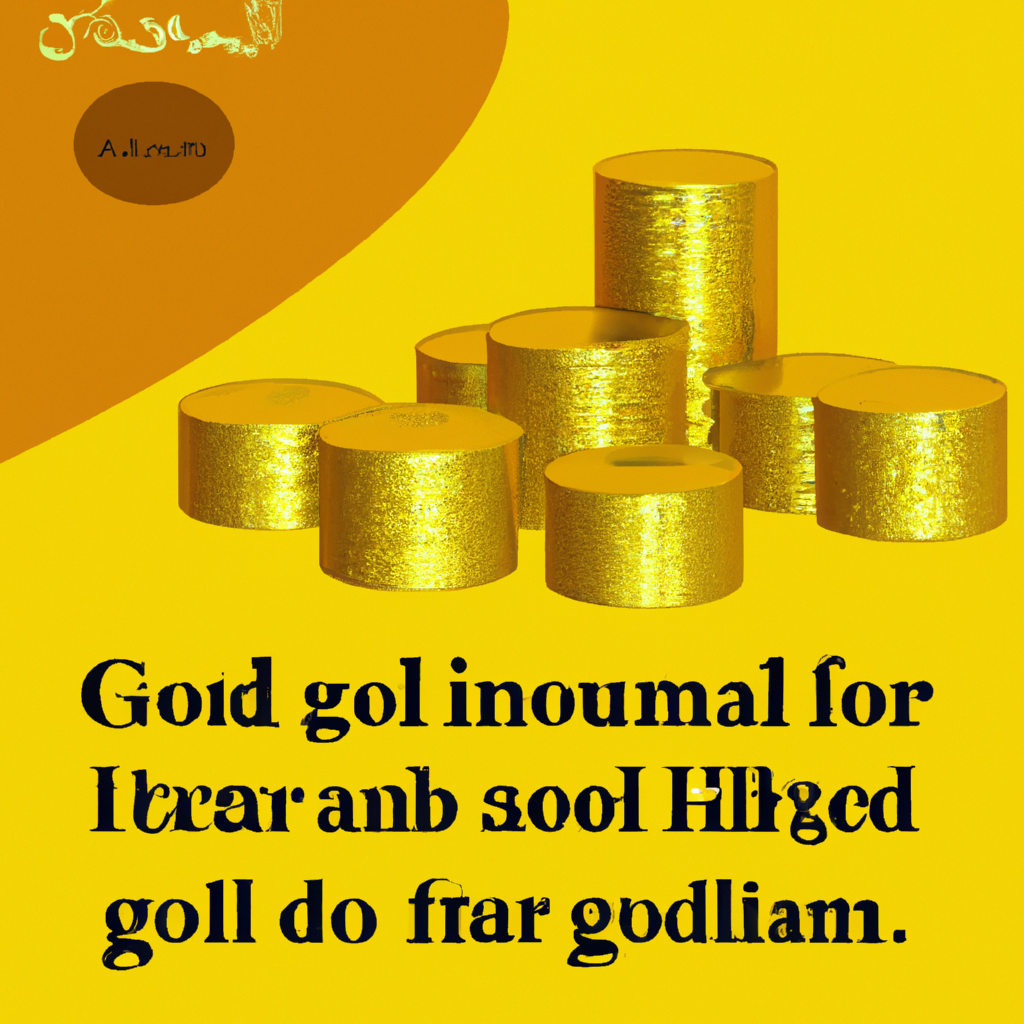Are you curious about the religious implications of investing in gold? Many people wonder if it is permissible or forbidden in Islam to invest in this precious metal. In this article, we will explore the question, “Is Investing in Gold Haram?” We will provide you with a comprehensive analysis that delves into the various perspectives surrounding this topic. By the end of this article, you will have a better understanding of whether or not investing in gold aligns with Islamic principles. So, let’s embark on this journey together and explore the depths of this intriguing subject.
Historical Perspective on Gold in Islam
Gold has held a significant role in Islamic history, with its importance dating back to the time of Prophet Muhammad (peace be upon him). This precious metal has been revered not only for its aesthetic beauty but also for its monetary value and cultural significance. Understanding the historical perspective on gold in Islam allows us to appreciate its place within Islamic finance and the various opinions surrounding its ownership and investment.

Importance of Gold in Islamic History
Gold holds a special place in Islamic history, as it is mentioned in the Quran and hadiths (sayings of the Prophet Muhammad, peace be upon him). The Quran describes gold as “adornments of gold” and a symbol of wealth and prosperity. It is also associated with purity and wisdom. The use of gold is prevalent in Islamic art, architecture, and jewelry, showcasing its cultural significance throughout history.
Moreover, the Prophet Muhammad (peace be upon him) himself owned and appreciated gold. He was often gifted with gold and silver, and even used gold utensils. This highlights the inherent value placed on gold in Islamic society and the recognition of its monetary worth.
Permissibility of Gold Ownership in Islam
The ownership of gold in Islam is generally recognized as permissible, as long as it is for personal use or purposes other than hoarding wealth. Islamic scholars agree that gold and other precious metals have intrinsic value and can be regarded as a form of wealth. Islam emphasizes moderation and advises against excessive attachment to worldly possessions. Thus, owning gold within reasonable limits is considered acceptable.
However, there are differing opinions regarding the permissibility of wearing gold jewelry for men, with some scholars considering it prohibited. This discrepancy arises from interpretations of hadiths that discourage men from wearing gold. As with many matters of Islamic jurisprudence, interpretation and contextual understanding play a crucial role in determining the permissibility of gold ownership.
Gold as a Currency in Islamic Societies
In Islamic societies throughout history, gold has often been used as a form of currency. Its durability, divisibility, and universal acceptance made it an ideal medium of exchange. Gold coins were minted by various Islamic empires, such as the Umayyad and Abbasid Caliphates, as well as the Ottoman Empire. These coins, known as dinars or rials, served as a means of facilitating trade and commerce.
Furthermore, gold has been used as a dowry (mahr) in Islamic marriages. The giving of gold to the bride symbolizes a financial commitment and serves as a protection for the wife. This practice reflects the monetary significance of gold within Islamic societies.
Scholarly Opinions on Gold as an Investment in Islam
Within the realm of Islamic finance, scholars hold diverse opinions on whether gold is a suitable investment. Some argue that gold should not be considered an investment at all, as it lacks the characteristics of a productive asset. They believe that investments should generate profits through active participation in economic activities, which gold fails to fulfill.
However, other scholars highlight the potential benefits of including gold in an investment portfolio. They argue that gold can act as a hedge against inflation and currency fluctuations. Additionally, gold’s historical performance has showcased its ability to preserve wealth during times of economic uncertainty. When analyzed against these factors, gold investment can be viewed as a means of diversification and wealth protection within an Islamic investment framework.
While there is a lack of unanimity among scholars regarding gold as an investment, it is essential for individuals to seek knowledgeable advice and make informed decisions based on their personal circumstances and goals.
Understanding Islamic Finance Principles
Islamic finance principles are based on the teachings of the Quran and Sunnah (traditions) of the Prophet Muhammad (peace be upon him). These principles differentiate Islamic finance from conventional finance by emphasizing ethical considerations and prohibiting certain practices that are deemed non-compliant.
Concept of Halal and Haram in Islam
In Islamic finance, the concept of halal (permissible) and haram (prohibited) plays a crucial role. Investments and financial transactions must comply with the principles of halal to ensure ethical behavior and adherence to Islamic teachings. This concept extends to all aspects of financial activities, including investment in gold.
Prohibition of Riba (Interest)
One of the fundamental principles of Islamic finance is the prohibition of riba, which refers to interest or usury. Islamic teachings consider riba unjust and exploitative, as it involves charging or receiving additional amounts on loans or debts. Consequently, the involvement in interest-based transactions, such as lending money with interest or earning interest on deposits, is strictly prohibited.
This prohibition has implications for gold investments, as certain investment products may involve interest-based transactions. It is essential for investors to ensure that their gold investments comply with the principle of avoiding riba.
Prohibition of Gharar (Uncertainty)
Islamic finance also prohibits gharar, which refers to uncertainty or excessive speculation in contractual agreements. Contracts or transactions that involve excessive ambiguity or uncertainty are considered void in Islamic law. This principle aims to promote transparency and fairness in financial transactions.
When considering gold investments, investors need to evaluate whether the investment contracts or products involve elements of gharar. This assessment ensures compliance with the principles of Islamic finance and helps mitigate potential risks.
Principle of Materiality in Islamic Finance
The principle of materiality in Islamic finance emphasizes the importance of tangible assets and productive economic activities. Islamic finance encourages investments in real assets that generate income or contribute to the growth of the real economy. This principle discourages investing in speculative or non-productive assets that do not add value to society or the economy.
When evaluating gold investments, it is essential to consider whether the investment represents a productive economic activity. This assessment aligns with the principle of materiality and ensures investments are in line with Islamic finance principles.
Arguments Against Investing in Gold
While gold investment has its proponents, there are several arguments against investing in gold within the context of Islamic finance. These arguments highlight potential concerns and limitations associated with gold as an investment vehicle.

Prohibition of Hoarding Wealth in Islam
One of the main arguments against investing in gold is the prohibition of hoarding wealth in Islam. Islamic teachings emphasize the circulation of wealth and discourage its accumulation without purpose. Gold, like other assets, should be used for productive purposes, benefiting individuals and society as a whole.
Critics argue that investing in gold, particularly for speculative purposes or as a means of accumulating wealth, goes against the principles of Islamic finance. Such investment practices risk diverting resources away from productive economic activities, hindering economic growth and social development.
Argument of Speculation in Gold Investments
Another argument against gold investments is the speculative nature of such investments. Gold prices are influenced by various factors, including market sentiment, geopolitical events, and macroeconomic indicators. Critics believe that speculating on gold prices is akin to gambling, as it involves predicting short-term price movements rather than considering the underlying value or productive potential of the asset.
Islamic finance encourages investments that align with real economic activities and contribute to societal welfare. Thus, some scholars argue that gold, being a speculative asset, may not fulfill these criteria and should be avoided in investment portfolios.
Similarities with Ribawi Goods
Gold is considered a ribawi good in Islamic finance, along with silver, dates, wheat, barley, and salt. Ribawi goods have specific requirements for trading, including immediate exchange and equal weight measures. They are subject to certain conditions and restrictions to ensure fair trade and avoid exploitation.
Critics of gold investments argue that the similarities with ribawi goods impose additional limitations on trading and investment in gold. Compliance with the requirements and conditions related to ribawi goods may limit the investment options available for gold and add complexity to gold investment strategies.
Lack of Productive Economic Activity
One of the primary concerns raised against gold investments is the lack of productive economic activity associated with them. Unlike investments in businesses or real estate, investing in gold does not generate income or contribute to economic growth. Gold is perceived as an inert asset that does not actively participate in economic activities.
Some scholars argue that investments should focus on assets that have the potential to generate income or contribute to society. They view gold investments as non-productive and argue that funds allocated to gold could be better utilized for investments in businesses or projects that create employment opportunities and contribute to the overall welfare of society.
Arguments in Favor of Investing in Gold
While there are arguments against investing in gold, proponents of gold investments in Islamic finance highlight various reasons why it can be a suitable investment option. These arguments consider the potential benefits and advantages of Including gold in an investment portfolio aligned with Islamic principles.

Gold as a Safe Haven Investment
One of the primary arguments in favor of gold investments is its status as a safe-haven asset. During times of economic uncertainty, political instability, or market volatility, gold tends to retain its value or even appreciate. This characteristic makes gold an attractive investment option for individuals seeking to protect their wealth during turbulent times.
Islamic finance principles emphasize risk mitigation and wealth preservation. Gold, with its historical track record as a safe haven, can serve as a means of diversification and protection against economic downturns or financial crises.
Protecting Wealth Against Inflation
Inflation erodes the purchasing power of money over time, making it crucial to protect wealth from its adverse effects. Gold investments have been considered an effective hedge against inflation due to the metal’s historical tendency to retain its value when other financial assets experience devaluation during inflationary periods.
Proponents argue that including gold in an investment portfolio can help preserve purchasing power and maintain wealth over the long term, aligning with the principles of Islamic finance.
Diversification of Investment Portfolio
Diversification is a fundamental principle in investment management, as it helps mitigate risk and optimize returns. Including gold in an investment portfolio allows for diversification, as it provides exposure to an asset class with a low correlation to traditional financial markets.
Gold’s performance often differs from that of stocks, bonds, or other financial instruments. By incorporating gold into an investment portfolio, investors can potentially reduce volatility and enhance the overall risk-adjusted returns.
Historical Performance of Gold
The historical performance of gold is often cited as a favorable factor when considering gold investments. Over the long term, gold has demonstrated the ability to preserve wealth and deliver positive returns. Its value has appreciated during times of economic uncertainty, market turmoil, and inflationary periods.
Proponents argue that the historical performance of gold supports its inclusion in an investment portfolio, especially for individuals seeking long-term wealth preservation and stability.
Scholarly Perspectives on Investing in Gold
Islamic scholars hold diverse opinions on the permissibility and suitability of investing in gold within an Islamic framework. Understanding these perspectives provides insight into the nuanced discussions surrounding gold investments.

Diverse Opinions among Islamic Scholars
Islamic scholars have differing views regarding gold investments, reflecting the variety of interpretations within Islamic jurisprudence. Some scholars take a more restrictive approach, discouraging gold investments due to concerns such as speculation, hoarding, or similarity to ribawi goods.
On the other hand, other scholars adopt a more inclusive perspective, acknowledging the potential benefits of gold investments when aligned with certain conditions and limitations. They emphasize the distinction between owning physical gold and engaging in gold contracts or derivatives.
The diversity of opinions among Islamic scholars regarding gold investments underscores the importance of seeking knowledgeable advice and considering individual circumstances when making investment decisions.
Differentiating between Physical Gold and Gold Contracts
A crucial aspect of the scholarly discussion revolves around the distinction between physical gold and gold contracts or derivatives. Islamic scholars generally agree that owning gold in its physical form is permissible, as long as it adheres to the principles of halal and aligns with Islamic ethics.
However, the permissibility of investing in gold through contracts, such as futures or options, is a topic of debate. Some scholars argue that these contracts may involve elements of excessive speculation or uncertainty (gharar), which can render them non-compliant with Islamic finance principles.
The differentiation between physical gold and gold contracts highlights the need for a nuanced understanding of Islamic finance principles when considering gold investments.
Consideration of Intent and Purpose in Investments
Islamic finance emphasizes the importance of intent and purpose in investments. While certain investments may be permissible from a technical standpoint, individuals must assess whether the underlying intent aligns with Islamic ethics and principles.
When considering gold investments, investors should reflect on their motives, goals, and intended outcomes. By evaluating the purpose behind the investment and ensuring it is in line with Islamic finance principles, individuals can make more informed decisions and uphold the ethical considerations emphasized in Islamic teachings.
Alternative Gold Investment Options
In addition to traditional gold investments, several alternative options exist for individuals seeking gold investments within the framework of Islamic finance. These options provide alternatives that address specific concerns or limitations associated with gold ownership and investment.
Investing in Gold-backed Cryptocurrencies
In recent years, the emergence of gold-backed cryptocurrencies has offered a potential solution for individuals seeking a digital representation of gold while adhering to Islamic finance principles. These cryptocurrencies are backed by physical gold held by trusted custodians, providing investors with exposure to gold’s value without the need to own physical gold.
By combining technology with the traditional concept of gold ownership, gold-backed cryptocurrencies offer a convenient and potentially Shariah-compliant alternative to traditional gold investments.

Investing in Shari’ah-compliant Gold ETFs
Shari’ah-compliant gold exchange-traded funds (ETFs) have gained popularity as investment products that provide exposure to gold while adhering to Islamic finance principles. These ETFs invest in physical gold or gold-related assets and aim to replicate the performance of gold prices.
The Shari’ah compliance of these ETFs is achieved through careful structuring and adherence to Islamic finance guidelines, ensuring that the investment activities and underlying assets align with Islamic principles. Investing in Shari’ah-compliant gold ETFs can offer individuals a convenient and compliant way to gain exposure to gold as an investment.
Purchasing Gold for Personal Use
Another option for individuals seeking gold investments within the framework of Islamic finance is to purchase gold for personal use, such as jewelry or collectible items. Gold in its physical form is generally considered permissible, provided it is acquired and used within the limits prescribed by Islamic teachings.
By acquiring gold for personal use, individuals can benefit from its cultural significance and aesthetic value while also aligning with Islamic finance principles. Additionally, personal use of gold ensures the fulfillment of intentions and purposes emphasized in Islamic finance.
Practical Considerations for Gold Investors
Individuals considering gold investments within the framework of Islamic finance should take practical considerations into account to ensure compliance with Islamic principles and maximize the benefits of their investments.
Seeking Advice from Knowledgeable Scholars
Given the diversity of opinions among Islamic scholars and the complexity of Islamic finance principles, it is crucial to seek advice from knowledgeable scholars when making gold investment decisions. Scholars with expertise in Islamic finance can provide guidance tailored to individual circumstances and ensure adherence to halal principles.
Knowledgeable scholars can help individuals navigate the nuances of gold investments, interpret Islamic teachings, and address potential concerns or questions regarding compliance with Islamic finance principles.
Understanding the Risks and Rewards of Gold Investment
Like any investment, gold investments carry risks and rewards that investors should be aware of. Understanding the dynamics of the gold market, including factors influencing gold prices and potential volatility, is essential for informed decision-making.
Gold investments may experience price fluctuations, liquidity concerns, and storage costs. Additionally, the potential rewards of gold investments, such as hedging against inflation or diversifying investment portfolios, should be weighed against an individual’s investment goals and risk tolerance.
Ensuring Compliance with Islamic Principles
The central principle in gold investments within the context of Islamic finance is adherence to Islamic principles. Investors should exercise due diligence in evaluating the permissibility of investment products and ensuring they comply with halal requirements.
This evaluation includes understanding the underlying investment structure, assessing potential involvement in interest-based transactions, avoiding excessive speculation or uncertainty, and considering the materiality of the investment.
By ensuring compliance with Islamic principles, individuals can engage in gold investments that align with their ethical beliefs and contribute to their financial goals.
Islamic Gold Investment Products and Services
Islamic gold investment platforms and services have emerged in response to the growing demand for gold investments within the framework of Islamic finance. These platforms provide individuals with access to gold investment opportunities that comply with Islamic principles.
Introduction to Shari’ah-compliant Gold Investment Platforms
Shari’ah-compliant gold investment platforms offer individuals the convenience of investing in gold while ensuring compliance with Islamic finance principles. These platforms provide various investment options, such as physical gold holdings, gold ETFs, or gold saving accounts, with the necessary Shari’ah screening and certification.
By utilizing Shari’ah-compliant gold investment platforms, individuals can enjoy the benefits of gold investments within an Islamic framework, backed by professional oversight and adherence to ethical considerations.
Evaluating Gold Investment Companies
When considering gold investments, it is crucial to assess the reputation and credibility of gold investment companies. Investors should thoroughly research the background, track record, and compliance measures of these companies to ensure they meet Islamic finance requirements and align with their ethical values.
Evaluating gold investment companies includes considering factors such as Shari’ah compliance, customer reviews and testimonials, regulatory compliance, transparency in investment operations, and adherence to ethical business practices.
Understanding Shari’ah Certification Process
Shari’ah certification plays a significant role in assessing the compliance of gold investment products and services with Islamic finance principles. Understanding the Shari’ah certification process is essential for individuals seeking gold investments within an Islamic framework.
Shari’ah certification involves the review and approval of investment products and services by qualified Islamic scholars. These scholars assess whether the investment activities and underlying assets comply with Islamic principles, ensuring that the investments are halal and aligned with ethical considerations.
By familiarizing themselves with the Shari’ah certification process and relying on certified products and services, individuals can invest in gold with confidence, knowing that their investments are compliant with Islamic finance principles.
Misconceptions About Gold Investments in Islam
Several misconceptions and misunderstandings exist regarding gold investments in Islam. These misconceptions can lead to misinformation and misinterpretation of Islamic teachings, causing confusion and uncertainty for individuals considering gold investments.
Assumptions of Riba and Gharar in Gold Investments
One common misconception is the assumption that all gold investments involve riba (interest) or gharar (uncertainty). While it is true that certain investment products or contracts may involve elements of riba or gharar, it does not imply that all gold investments fall into this category.
Islamic finance principles emphasize the importance of proper structuring and compliance measures to ensure that investments are free from riba and gharar. By adhering to these principles and seeking Shari’ah-compliant investment options, individuals can invest in gold without encountering such prohibited elements.
Confusion between Hoarding and Wealth Preservation
Another misconception revolves around the confusion between hoarding and wealth preservation. Islam discourages hoarding wealth without purpose or intention of utilizing it for productive means. However, wealth preservation is regarded differently, as it involves protecting wealth from erosion and volatility in order to ensure financial stability.
Gold investments, when pursued for the purpose of wealth preservation within reasonable limits, align with Islamic finance principles. It is essential to distinguish between hoarding and wealth preservation to avoid misconstruing gold investments as non-compliant with Islamic teachings.
Misunderstandings about Gold as a Commodity
The perception of gold as a commodity rather than an investment can lead to misunderstandings regarding gold investments in Islam. Gold is not merely a physical object with material value; it carries cultural, historical, and aesthetic significance, making it a multifaceted asset.
While gold can be considered a commodity due to its market tradability, it also possesses characteristics that differentiate it from conventional commodities. Gold’s status as a safe-haven asset, historical performance, and potential as a wealth preservation tool provide additional dimensions that position gold as a unique investment option within Islamic finance.
Concluding Thoughts
The question of whether gold investments are halal or haram in Islam is a complex and multifaceted topic. Understanding the historical perspective on gold in Islam, the principles of Islamic finance, and the arguments for and against gold investments allows individuals to make informed decisions that align with their ethical beliefs and financial goals.
Islamic finance principles emphasize ethical conduct, risk mitigation, and wealth preservation while promoting societal welfare and economic growth. Individuals seeking gold investments within an Islamic framework must meticulously assess investment options, seek knowledgeable advice, and ensure compliance with halal requirements.
Ultimately, the responsibility lies with the individual to determine the permissibility and suitability of gold investments within their own understanding of Islamic finance principles. With the ongoing development of Islamic finance and the diversity of opinions among scholars, individuals have the opportunity to navigate the complexities of gold investments and contribute to the continued evolution of Islamic finance.








